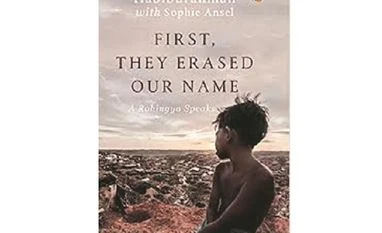The book opens to Habiburahman, a three-year-old Rohingya child living in Burma, now Myanmar, under the Buddhist military dictatorship. The dictator U Ne Win, in 1983, has a new project. A law comes into place, and from then onwards, to retain Burmese citizenship, one has to belong to one of the 135 recognised ethnic groups, which form part of the eight “national races.” With a stroke of a pen the Rohingya officially disappear from Burma.
The first half of the book traces a sordid childhood, where the author’s mother mysteriously leaves for a journey only to return and never speak of it. Through school and later university life, learning, camaraderie, relationships and secret societies are all underlined by notions of identity and what it means to live with it, under a dictatorship.
Littered casually through the book, are instances that demonstrate the constant necessity for paperwork, licences, permissions, arbitrary taxes, and certificates, that a Rohingya must possess to exist as a non-citizen. Often the lack of these (or the mood of the authorities) translates to extortion and indefinite brutal imprisonment. Each such instance illustrates what it means to have your citizenship stripped.
The most basic of freedoms — to fall in love and to study — are denied. Rohingya need state permission to get married, which most can’t afford. In few places like Buthidaung and Maungdaw, Rohingya are forbidden to marry. They cannot travel. They cannot enrol into university. The author at one point wonders, “I would like to be able to aspire to something other than cleaning toilets in our hostels and repairing electrical parts, but it will be a long journey.”
First They Erased Our Name
Author: Habiburahman & Sophie Ansel
Publisher: Penguin
Pages: 256
Price: Rs 399
The title of the book draws from the first stages of delegitimisation of the Rohingya in Myanmar. Ethnic cleansing operations under poetic titles such as “Purify and Whiten like the Jasmine Flower” and “Clean and Beautiful Nation” have been performed in the past. The Rohingya have been dehumanised through time, and considered “evil ogres from a faraway land, more animal than human.”
Their name and their identity are intractably linked. Both become reasons for death and dislocation. The author grows up being told by his father, that “Rohingya” is a secret identity. They are considered “Bengali invaders” who have entered the country illegally. They are called kalars, a pejorative against dark-skinned ethnic groups. There are arbitrary executions, and homes that are burned down. To erase the traces of Rohingya in Myanmar’s past, mosques are demolished and history rewritten.
A young Habib has to grapple with who he is. Sometimes a kalar, other times a Bengali invader, often a Muslim, but always a Rohingya — the complex web within each layer of his identity is omnipresent, ready to entangle the author depending on what aspect of it offends the authorities on a particular day. The author's grandmother affectionately tells him once, “They see you as too black. Too Muslim. Too Negro. Too different. A parasite, like the rest of us.”
However, there is no self-pity in the author. Rather, as the narrative unfolds, we witness a dignified acceptance of the fact that the lives of the Rohingya, as dictated by a law, is of a second-class people. Grandmothers tell stories of the past to the children, and the author’s father is constantly writing in his yellowing notebooks. He says, “Our history of Arakan and our identity will only be known through written documents.” Rohingya intellectuals confide that they keep “their precious memories carefully hidden under a mattress or a wooden floorboards”. These photos of “young educated Rohingya lawyers, doctors, and teachers are rare, and date from a period that was very different” These photos serve as an evidence of a better and a more civilised past.
At 17, Habib is imprisoned and tortured and manages to escape to Thailand. But there is no happy ending. The world outside is as cruel to a Rohingya as his own home. He gains refugee status from the United Nations, but it does not translate to any real protection. Over the years he is arrested and held several times in immigration detention centres in Malaysia, then sold by Malay and Thai immigration officers to human traffickers, who then sell him to mafia of Thai fisherman.
In 2004, he becomes a slave in the Andaman Sea. Eventually he manages to escape to Australia and is sent to an immigration detention centre in Darwin. At one point, a Rohingya friend remarks, “I can’t tell you which country might be most welcoming for stateless people like us. I’ve been in many places and each one is as horrendous as the next.”
This book offers a view of how politics, policies, and choices made by any dispensation percolate and play into the individual and private lives of those whom they impact. The discrimination, violence, and mindless hatred for a single ethnic group seldom enters the vocabulary of country on its own. Rather it is built into it, one law, and distorted narrative at a time. The world, however sympathetic, seldom aids the stateless. We hear this story not through the words of a compassionate outsider or an articulate advocate, but by an ordinary man who lived through it all — simply because of his name.
Unlock 30+ premium stories daily hand-picked by our editors, across devices on browser and app.
Pick your 5 favourite companies, get a daily email with all news updates on them.
Full access to our intuitive epaper - clip, save, share articles from any device; newspaper archives from 2006.
Preferential invites to Business Standard events.
Curated newsletters on markets, personal finance, policy & politics, start-ups, technology, and more.
)